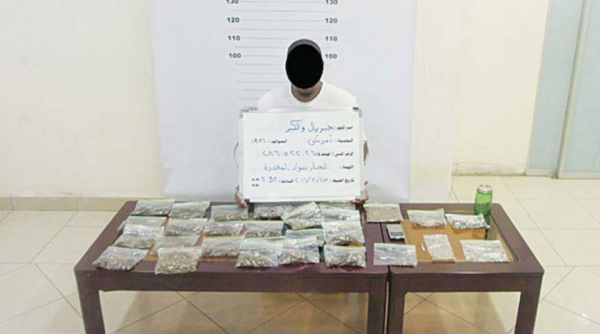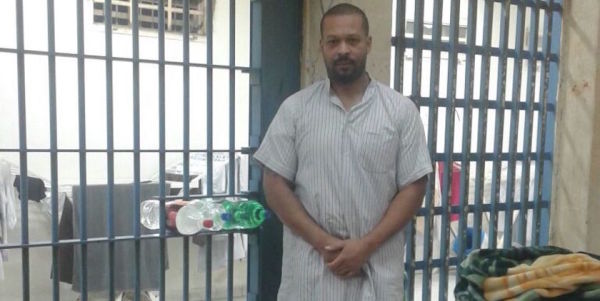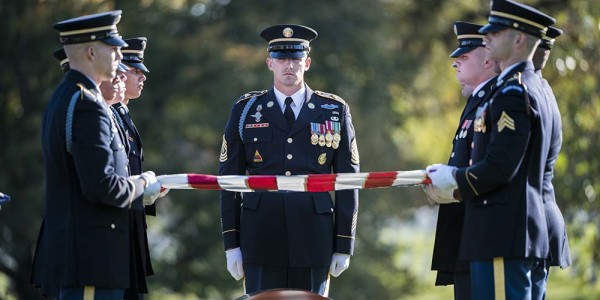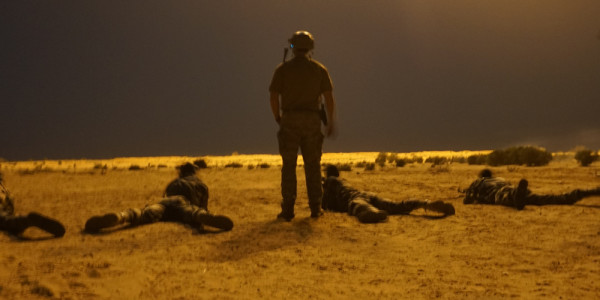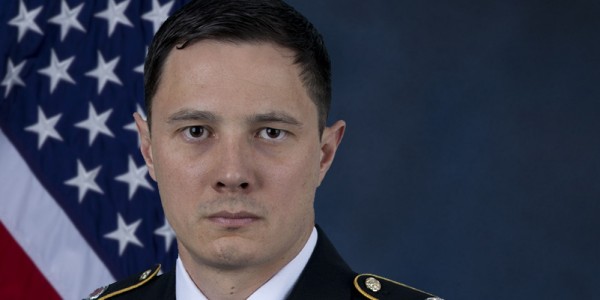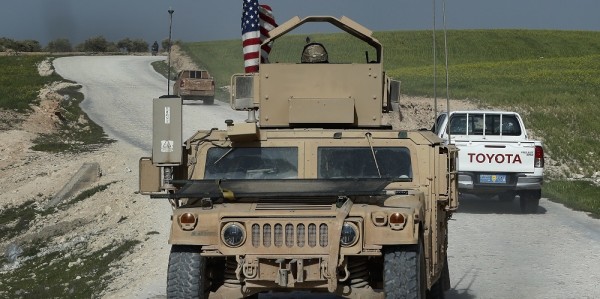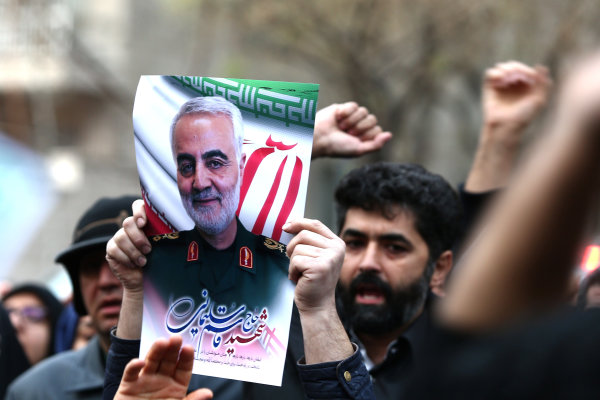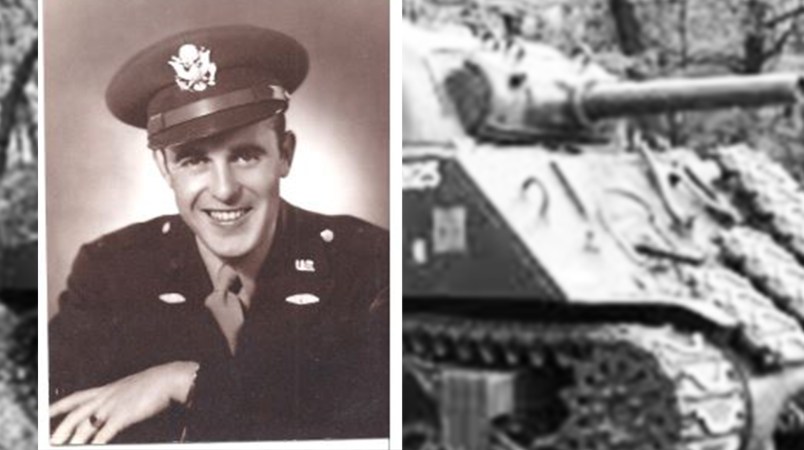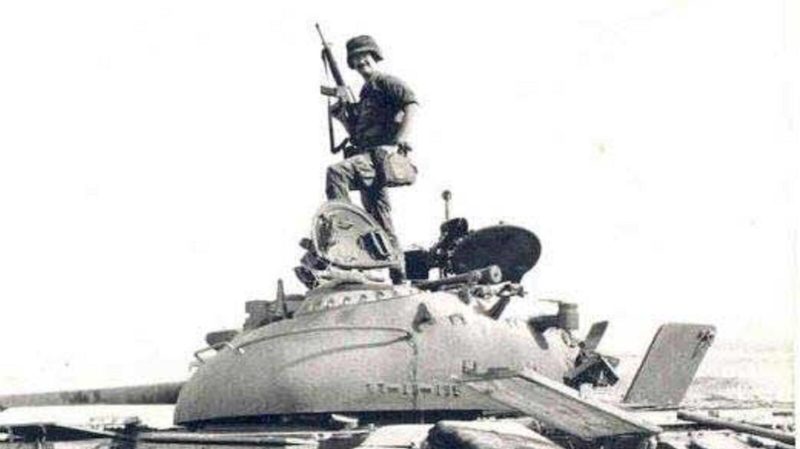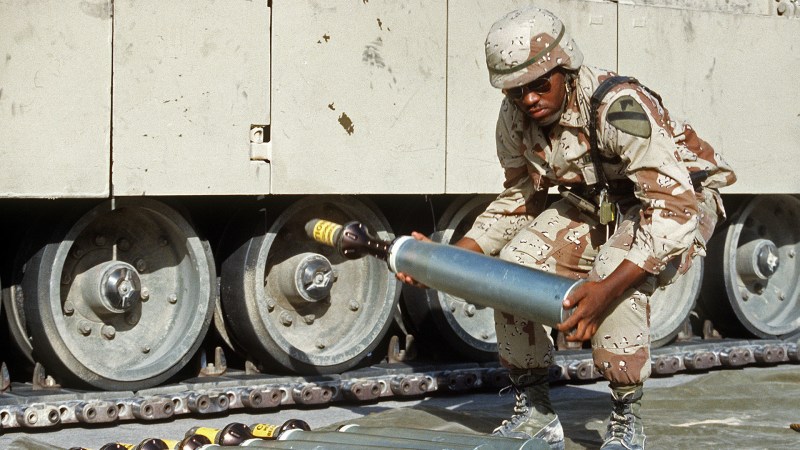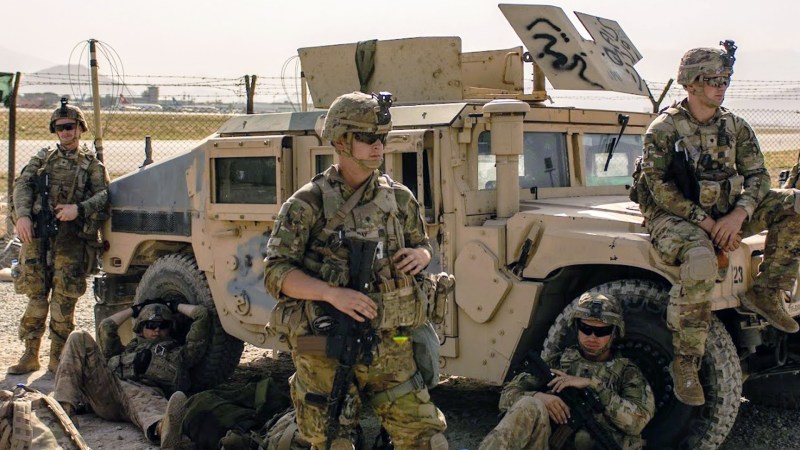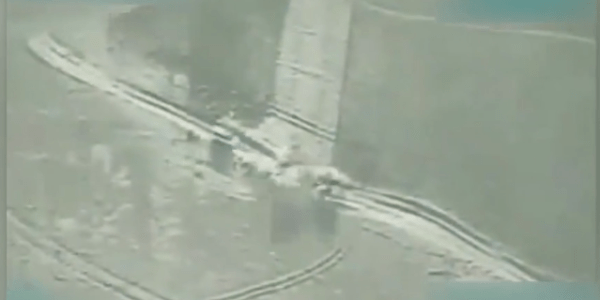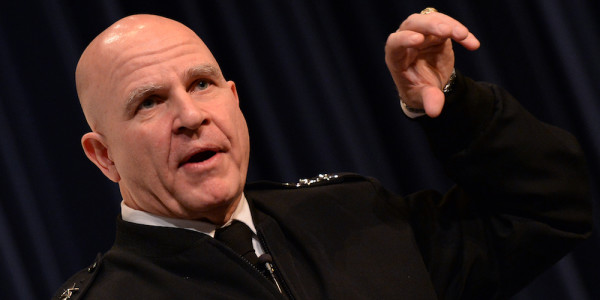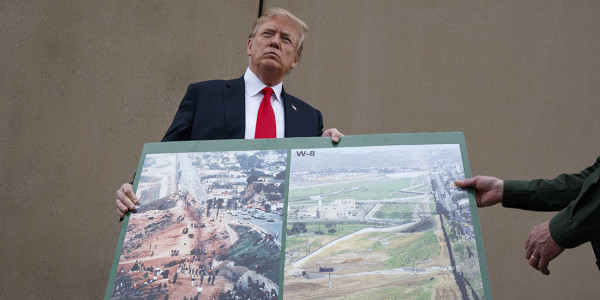When Barbara Jennings made her first trip to the Middle East in 1991, she was a soldier, deployed to Saudi Arabia for Operation Desert Storm. A native of Georgia, she served in the Army for two decades and completed several more overseas tours before retiring in 2003. Then, like many veterans, she kept deploying as a defense contractor.
Four years ago, she took a job on Camp Arifjan, a U.S. military base in Kuwait. She had never intended to stay this long, but in March 2016 something happened that may very well keep her there for the rest of her life.
Her son, Gabriel Walker, also a contractor, was sentenced to 20 years in Kuwaiti prison for the crime of marijuana possession. Jennings says she won’t go home without him.
Jennings, 62, has few if any allies in her fight for Walker’s repatriation. Numerous appeals to U.S. government officials and politicians have yielded only moral support. Walker’s employer, the Kuwait-based company KGL Logistics, fired him as soon as he was behind bars. There are also language barriers, and absent lawyers, and secretive trial proceedings, and countless emails from the United States Embassy explaining that there’s very little it can do.
It is a battle that Jennings appears all but certain to lose, but the alternative is not an option. She keeps a letter from her son as a reminder of why she can’t give up. He wrote it several months after he got arrested, before his father died — “of grief and heartbreak,” Jennings said. The letter begins, “Today, I was tortured and beaten by guards dressed in all black with their faces covered and a white skull on the right side of their chest.” It is nearly 3,000 words long.

Gabriel Walker before he was detained by Kuwaiti authorities in 2016.Photo courtesy of Barbara Jennings
At the very least, Jennings being in Kuwait gives Walker hope — and, no less important, a connection to home. He is one of just a handful of Americans being kept in a prison stuffed with approximately 3,500 more inmates than it is designed to hold. In his letter, he recalled being asked by one of the guards how he had managed to survive behind bars for as long as he had without speaking Arabic. “I told him that I survive like a dog,” Walker wrote.
On March 6, Arab Times reported that the Kuwaiti Interior Minister Sheikh Khalid Al Jarrah Al-Sabah announced plans to build a new prison and “deport foreign inmates whose countries are ready to accept them.” The transfers are part of a bigger initiative launched in late January to address severe overcrowding in Kuwait’s prisons — specifically, Central Prison, where Walker and at least seven other Americans, all defense contractors, are being held.
This is the third article about Americans imprisoned in Kuwait that Task & Purpose has published since Feb. 20. Over the course of our reporting, we have contacted or attempted to contact numerous government agencies and officials, including the Department of State, the Department of Defense, the American Embassy in Kuwait, the Kuwaiti Embassy in Washington, and multiple U.S. senators. Few have even been willing to comment.
Only the State Department has been receptive to our queries, but it declined to comment on whether the department has taken measures to ensure that U.S. citizens are on the list of foreign detainees deported from Kuwait. However, a U.S. Army veteran serving a life sentence in Central Prison told Task & Purpose via WhatsApp that from his vantage point it appears as if the American inmates will be among the few who don’t make the cut.
+++
Jennings moved to Kuwait to be closer to her son, whom she had helped secure a job in contracting after a three-year stint at the University of West Georgia. The two shared an apartment in the town of Mahboula, about a 40 minute drive down the Persian Gulf coastline from Kuwait City. For a time, they worked together on Arifjan, which houses the bulk of the 15,000 American troops stationed in the country. Jennings checked vehicles entering the base for bombs. Walker was her supervisor — a position that required a secret security clearance, Jennings is quick to point out. He has no criminal record in the United States.
Eventually, Walker got a job with KGL escorting trucks delivering mail to Arifjan and other U.S. military installations. By that point, he’d been working in Kuwait for about six years. It was home.
Inside Kuwait’s Central Prison

Walker was staying at a friend’s apartment when he was arrested in the early hours of March 22, 2016. According to court documents, he was awakened around 3 a.m. by the sound of the doorbell. The police entered the apartment with their guns drawn.
The lead detective, a lieutenant named Abdullah Salem Aloutian, later testified that Walker immediately led the agents to the room where he had been sleeping. His account of the incident was included in a deposition Jennings had to pay someone to translate into English. This is how it describes how the raid unfolded:
“He decided that he had narcotic drugs which he is hiding !! in his room !! And instruct him to search the room !! he found glass box containing inside half of a used cigarette !! Suspected !! And then also decided to confront the accused with those seizures !! He acknowledged its related to him and decided that possessed the narcotic substance for consumption!! He went on saying!! As he confronted him with the result of his investigations !! He decided that he had a quantity of narcotic substances hidden at home roof !! And possessing it!! For trafficking purposes!!”
In a recent interview with Task & Purpose, Abenojar didn’t dispute the detective’s version of events, but provided some essential context. Abenojar now lives in Florida with his wife and children. On the phone, he was polite and soft-spoken. For him, it seemed, the raid was a crazy — and terrifying — thing that happened before he moved on with the rest of his life. He said that he had completely lost track of Walker soon after the ordeal. He was surprised to learn that his former roommate had been given a 20 year sentence. When I told him about the torture described in Walker’s letter, there was a long pause as he absorbed the information.

A Central Prison inmate’s dinner (before consumption).
“It’s ridiculous, because drugs are everywhere in Kuwait,” Abenojar said. “And it’s not just the rebellious youth that does it. It’s the older guys, too. I had a couple Kuwaiti friends who were in the military and they kept pounds of hash in their apartment. The cops were just targeting Americans. All the other guys who got hemmed up during that time — the Syrians, the Egyptians — got let go. They just wanted to make an example of us.
“And Gabe was an easy target,” he added. “In the Middle East, the stereotypical American gangbanger, drug dealer is black. I’m Asian.”
Abenojar said the police were already in the apartment by the time he woke up and walked out of his room to figure out the source of the commotion. Walker, he said, was on the floor. Next to him, there was another American — a friend of Walker and Abenojar’s who had stayed over that night. Abenojar was also ordered onto the floor at gunpoint. He and Walker were shackled together while their friend led the detectives to the roof. The cops who stayed back in the apartment, Abenojar said, kept threatening them with tasers. Later, the third American said the detectives nearly threw him off the building.
According to Abenojar, Walker owned up to the marijuana found on the roof. “He liked to partake every once in a while,” is how Abenojar put it. In Abenojar’s room, the detectives found a few bottles of alcohol, which is illegal in Kuwait. All three Americans were taken to jail and put in a holding cell. Five or six days later, Abenojar said, U.S. Embassy officials paid them a visit. “The consular guys said there’s nothing we can really do for you right now, and we never heard from them again.”
Then the interrogations began. Abenojar said that during his interrogation the police positioned him such a way that he had a clear view of a hallway where other inmates were “getting the crap” beaten out of them. “They were making them run up and down the hall while they beat them with sticks,” he recalled. “They were trying to intimidate me or whatever.” Two weeks later, trio was transferred to a section of the prison reserved for inmates awaiting deportation. On the second night, Walker vanished. Abenojar never saw him again.
Before Abenojar was deported, the detectives took him back to his apartment for one final search. He hadn’t showered in days and he was still wearing the same clothes he had been arrested in. While the police ransacked the apartment, he dumped as much of his belongs into a single bag as he could. “They were just told dicks,” he said. “They told me I smelled like shit and then took my cologne and sprayed half the bottle in my face. And, man, my fish. I had it for two years. They killed it.”
+++
Jennings learned of her son’s arrest from one of his friends. “KGL did not even give me a courtesy call,” she told Task & Purpose. (KGL has not replied to requests for comment.) Jennings said it took her a day just to track down Walker. He was being held in Central Prison, a notoriously overcrowded jail complex on the edge of Kuwait City.

A Navy A-7 Corsair jet is pulled down Broadway Avenue as sailors rejoice on the wings during the Operation Welcome Home ticker-tape parade during the 10 June 1991 celebration for returning Gulf War troops. An estimated 1 million people came to welcome some 24,000 Desert Storm veterans.Photo by DON EMMERT/AFP/Getty Images
Jennings found a lawyer, named Fayez Tahous Al-Otaibi, through a Kuwaiti friend. He came highly recommended. “This attorney is very good and has dealt with many high profile cases,” the friend wrote Jennings in an email. “He is well known to many of the judges, advocates, and other court personnel. As far as mitigating the damage, he is one of the best chances that Gabriel has.”
The friend estimated that Jennings would spend around 4,000 Kuwaiti dinar, just over $13,000, in legal fees by the time Walker’s trial was over. Al-Otaibi barely spoke English, but the other attorneys Jennings had approached wanted to charge her a lot more. One, she said, asked for $90,000. Also, Al-Otaibi assured her that he’d successfully defended Americans in court before.
In April 2016, a U.S. defense contractor named Monique Coverson and her partner Larissa Joseph were released from a Kuwaiti prison after 11 months behind bars for bogus drug charges. According to Jennings, Al-Otaibi claimed to have represented them in court. Jennings is now convinced that was a lie.
Al-Otaibi further buoyed Jenning’s confidence by noting three major flaws in the prosecution’s case. First, the detectives had searched the apartment without a warrant. Second, Walker’s name wasn’t on the lease. The man who lived there, also an American defense contractor, was arrested but never charged. Third, the detectives claimed to have found the drugs on the roof of the apartment, which, as Al-Otaibi pointed out, meant they could have belonged to anyone who lived in the building.
How deftly and to what extent all of this was argued in court remains unknown to Jennings — who wasn’t allowed to attend the trial — and also Walker himself.
In a recent interview, Jermaine Rogers — a U.S. Army veteran serving a life sentence in the same prison as Walker, on a similar charge — explained that defendants are not allowed to speak to the judge directly.

Tyrone Peterson, an American inmate in Kuwait’s Central Prison.Photo via Change.org | Barack Obama: Give Tyrone back his FREEDOM
“We have to speak through the lawyers, and half the time the lawyers don’t even show up to court,” he said. “I was asked three questions by the prosecutor: Do you sell drugs? Do you use drugs? And where did the drugs come from? That was it.”
“There is one court translator for all of the American inmates,” Rogers continued. “She’s a Filipino lady who speaks neither English nor Arabic fluently. I asked the U.S. Embassy to provide a translator and they said they can’t interfere.”
Jennings said she paid Al-Otaibi about $20,000 before he stopped returning her calls and emails in December. “He gave me all the confidence it wasn’t going to go this far,” she said, “but all he’s done is take money.” (Task & Purpose has not been able to reach Al-Otaibi for comment.)
+++
Jennings feels conned. The truth may be bigger than that. The presumption of innocence is a foundational principle of the American justice system. In U.S. court, prosecutors must prove, beyond reasonable doubt, that a person is guilty of the crimes they have been accused of. That’s not always the case in Kuwait, according to Sahar Khan, a visiting research fellow in the Cato Institute’s Defense and Foreign Policy Department.
“In the Middle East and South Asia, the concept of a fair trial — of having proper evidence — is rare,” she said.
A deep-seated suspicion of outsiders may also be at play. The agents who detained Walker belonged to Kuwait’s Criminal Investigations Department (CID), the same agency that carried out the arrests of the five other American contractors whose cases Task & Purpose examined. Khan described CID units — which are ubiquitous in the region — as “counterterrorism bureaucracies that have been created in the name of protecting the state’s territory.” Oftentimes, she said, they target foreigners, and “either plant evidence or accuse you of something you’ve never heard of before, and then put you in jail.”
Allegations of CID agents planting evidence are a common theme in the stories we’ve heard from American inmates in Kuwait and their families. Of course, due to the lack of transparency, it’s impossible to know whether those claims are true. In court, it is the defendant’s word against CID’s. Kuwaiti judges seem more sympathetic to the latter.

US President George W. Bush gestures as he speaks to military personnel and coalition forces during a visit to US Camp Arifjan, 60 kms (35 miles) south of Kuwait City, 12 January 2008.Photo by JIM WATSON/AFP/Getty Images
Through conversations with current and former inmates, as well as their families, Task & Purpose had identified eight Americans being held at Central Prison. All are African American and were working as defense contractors when they got arrested. (“There’s very little empirical evidence about this, but there absolutely is an element of racism,” said Khan.) According to Rogers, all eight were convicted of drug charges, and the lightest sentence among them is 15 years.
As we’ve previously reported, the guards at Central Prison have a reputation for mistreating foreign prisoners. One former inmate, a U.S. Air Force veteran, told Task & Purpose that he suffers from extensive nerve damage as a result of all the beatings he endured in the several months he spent in the prison last year. Most of the abuse, he said, occurred during raids carried out by an ultra-aggressive police unit dubbed “special forces.”
For another former inmate, the worst part of being incarcerated at Central Prison was the conditions. “In jail, you expect to fight,” he said, “but it’s just so fucking unsanitary.” All of the current and former prisoners we spoke to claimed that it is not uncommon for upwards of 50 men to be squeezed into 15-man holding cells for days or even weeks at at a time. Rogers said inmates are fed very little and compared mealtimes to “dogs in the street fighting over scraps.”
Walker also has a story of abuse, which he told in a painstakingly detailed 2,682-word letter to his mother last year. In the letter, he recounts how he awoke one morning to find himself confronted by a group of “guards dressed in all black with their faces covered and a white skull on the right side of their chest.”
According to Walker, the guards took him to a courtyard, where he was forced to stand barefoot on scalding pavement before being zip-tied and beaten so badly that at one point he “saw sparks of light, as if I was staring directly at a camera bulb as the flash went off.” Of what happened next, he wrote:
“I collapsed back down to the floor hoping they would think that I had passed out and stop. They continued to beat me, pushing my head into the ground and yelling at me to get up. I continued to act unconscious, until I felt someone trying to pull my pants down and turn me onto my stomach. That’s when I started yelling out for help. I knew my calls for help were worthless, because the only ones capable of helping me the ones allowing them to attack me. One of the leaders, who spoke English, asked me why I wasn’t getting up. I shouted that I couldn’t move because they were standing on my legs. They continued to hit me the conversation. He ordered them all to stop and allow me to get up.”
Jennings immediately sent the letter to the U.S. State Department, and was stung by the coldness of the response. “They just said he wasn’t hurt that bad,” she told Task & Purpose.
This is another common theme. Rogers claimed he was present when Walker reported the incident to a U.S. Embassy official during a visit to Central Prison in September 2017. He described the official as being “pretty nonchalant” as he listened to Walker describe in explicit detail what happened to him.
“In my opinion, he should have told Gabe to go to the cameras and file a case against the special forces,” Rogers said. “He said it happened in the mosque area and there are security cameras in there. They could’ve pulled the footage.”
Task & Purpose asked the State Department to verify that it had received Walker’s letter, and also explain how it responded to the abuse allegations. A department official confirmed that it was “aware of reports of a U.S. citizen arrested in Kuwait in March of 2016,” but declined to comment directly on Walker’s case. “We work with prison officials to ensure treatment consistent with internationally recognized standards,” the representative said in an email. “We monitor conditions in foreign prisons, advocate for appropriate medical attention, and may protest allegations of abuse against U.S. citizen prisoners when requested to do so by the prisoner.”
+++
When Kuwait’s Interior Minister announced in January that it planned to significantly reduce the country’s prison population, it said it would begin by transferring 200 Indian and Egyptian inmates to finish their sentences in their home countries. Gulf News Kuwait reported that 700 Kuwaitis convicted on drug charges would also be released.
A State Department official said in an email to Task & Purpose on March 6 that his office had “seen the media reports” of the Kuwaiti government’s recent decision to grant repatriation to “foreign inmates whose countries are ready to accept them.” The representative declined, however, to say whether or not the U.S. would be one of those countries.
“We routinely cooperate with foreign governments in documenting and accepting U.S. citizens for their return to the United States,” the official said. “We would refer you to Department of Justice or the Government of Kuwait for additional questions.”
Jermaine Rogers after his arrest in Kuwait

The Kuwaiti Embassy in Washington has not responded to several to requests for comment, and the Department of Justice has yet to reply to our initial query. We will update this article if and when it does.
Rogers told Task & Purpose that in recent days droves of foreign inmates in Central Prison have signed and thumb-printed forms to begin the transfer process. Various countries, he said, have been sending the prison lists of prisoners they want to repatriate. “We have the lowest number of inmates here aside from two British guys and four Canadians, and all of them have already given their signatures,” he said. “The U.S. is basically the only country that hasn’t sent a list.”
+++
The U.S. has prisoner transfer agreements with 83 nations around the world. Kuwait is not one of them. However, prisoners exchanges between the two countries certainly seem possible. Two months prior to Walker’s arrest, the last Kuwaiti held at Guantanamo Bay, a “high risk” detainee named Faez Mohammed Ahmed Al-Kandari, was sent home. Kandari had been captured in 2002 by American forces in Afghanistan and was believed to have served as both an Al-Qaeda recruiter and a bodyguard for Osama bin Laden.
Kandari was one of 12 Kuwaitis who had been detained at the facility in Cuba over the course of the War on Terror. All were suspected of having links to the Taliban or Al Qaeda. Kuwait spent an estimated $34 million fighting for their repatriation. One of the first to be transferred to the Kuwaiti government turned up a few years later as a suicide bomber in Iraq.

Kuwaiti protesters wearing orange prison jumpsuits similar to those worn by prisoners at the US detention camp in Guantanamo Bay take part in a demonstration in the tenth anniversary of the opening of the camp, outside the US embassy in Kuwait City on January 11, 2012 to demand the release of Kuwaiti prisoners who are still being held there.Photo by YASSER AL-ZAYYAT/AFP/GettyImages
Walker and the other Americans incarcerated at Central Prison are not suspected terrorists. Like the 700 Kuwaitis released after the announcement in January, they were convicted of drug offenses. They were also men and women employed to support the U.S. military in an allied country that has long depended on America to bolster its national security, beginning with the expulsion of Saddam Hussein’s army in 1991. Most are veterans. At least one — a man named Tyrone Peterson, who is serving a 15 years sentence for a marijuana conviction — fought in the 2003 invasion that toppled Saddam.
The Kuwaiti judge who sentenced Jenning’s son to 20 years in prison should have been aware of her service during the first Gulf War. It’s explained in the deposition. “The accused present who has no precedents in any of the areas of crime and his criminal record whiter than white and his mother is old and has worked in the army US during the war to liberate Kuwait from the brutal Iraqi aggression,” the lawyer wrote.
However, as Khan noted, the memory of Desert Storm has faded from the collective memory in Kuwait — though a bronze bust of Saddam seized from Iraq after Baghdad fell to American forces sits in the National Memorial Museum in Kuwait City. Younger Kuwaitis, Khan explained, are more likely to remember the aftermath.
“The U.S. and Kuwait have had an economic agreement for a long time about oil sales, and Kuwait had to agree after the Gulf War to sell their oil to the U.S. at a reduced price,” Khan said. “My sense is that [Kuwait] isn’t happy about that, because it’s not a very diverse economy. They’re worried that oil prices are falling. There’s a very high unemployment rate. Kuwaitis generally don’t work, or they work government jobs and get paid very well for that. It’s an unsustainable economic model. I think some of it might be resentment toward the U.S. and the deal they made after being liberated during the Gulf War.”

BAGHDAD, IRAQ – JUNE 14: Foreign securety personnel evacuate their comrades at the scene of a car bomb, on June 14, 2004 in Baghdad, Iraq. A car bomb exploded at rush hour as three civilian sport utility vehicles – the kind favored by Western contractors – passed by one of Baghdad’s most heavily trafficked square. Dozens have been wounded in the blast.Photo by Wathiq Khuzaie/Getty Images
Even American politicians — champions of veterans, each and all — seem impervious to Jennings’ desperate pleas for help. The offices of Georgia’s Republican Senators David Perdue and Johnny Isakson responded to requests for face-to-face meetings to discuss Walker’s case — “Please I beg you as a U.S. citizen and a veteran help me get my son home” — by sending letters of inquiry to the U.S. Embassy in Kuwait, and that appears to be all. Both offices confirmed to Task & Purpose that they had been in contact with Jennings and the Embassy, but declined to comment further, citing privacy concerns.
The familiar metrics for measuring the U.S. military’s sacrifices in war — troop levels, casualty figures, M.I.A reports, suicide rates — don’t also apply to defense contractors. One independent report estimated that between 2001 and 2010, more than 2,000 American contractors were killed in Iraq and Afghanistan, accounting for roughly 25% of all U.S combat fatalities during that period.
But contractors support U.S. military operations in dozens of other countries. How many are stuck in foreign jails or have been taken prisoner of war is unknown. The U.S. State Department keeps no official tally of those who never made it home — or at least not in a public database. Nor will the department disclose whether American contractors are covered by the Status of Forces Agreement (SOFA), a classified bilateral agreement to ensure that “U.S. forces in Kuwait be subject to U.S. rather than Kuwaiti law.”
Contractors are invisible by design. That is precisely why Washington has come to rely on them so much.
“When push comes to shove, I don’t think the U.S. would go to bat for defense contractors,” said Khan. “They are sort of obligated to go to bat for service members, and though most of the contractors are veterans — they served our country — the U.S. government doesn’t really care. They don’t serve this country anymore. Unfortunately, I think they’re falling through, which is horrific.”

